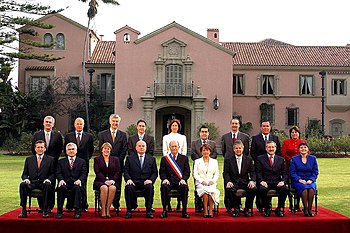From the political point of view, as early as August 1991, President Aylwin himself “notified” the country that “the transition has been made” and that “in Chile we live in democracy” (El Mercurio; 8-8-1991), given that by that date none of the requirements set out in 1984 by the Democratic Alliance (predecessor of the Concertación) for a truly democratic Constitution had been met (see Patricio Aylwin – El Reencuentro de los demócratas. Del golpe al triunfo del NO; Edic. Grupo Zeta, 1998; p. 259). Thus, what in 1984 were posed as requirements for the existence of an effective democracy, in 1991 came to be conceived as simple factors for the “improvement” of an already existing democracy. All this culminated in 2005, when, after some important changes to the Constitution – obviously agreed between the right and the Concertación, but which did not alter its authoritarian and neoliberal essence, as everyone now recognises – Ricardo Lagos and all his ministers fervently subscribed to the current text, leaving out Pinochet’s signature!
In turn, in the ambit of human rights, the programmatic commitment to seek justice by repealing the 1978 amnesty decree-law was also abandoned from the outset; as the leading ideologist of the transition, Edgardo Boeninger, acknowledged (see Democracy in Chile. Lecciones para la Gobernabilidad; Edit. Andrés Bello, 1997; p. 400). Moreover, on numerous occasions – in conjunction with the right wing – laws were sought to extend the amnesty until 1990 or to close the cases of detainees-disappeared without justice.
This failed thanks to a strong moral reaction from victims’ families and human rights NGOs. Those attempts – happily frustrated – can be understood by the positive assessment that the Concertación leadership acquired of the economic and social work of the dictatorship. A concordance in the ends always makes a discordance in the means less problematic, however profound it may have been.
In the same vein, the Aylwin and Frei Ruiz-Tagle governments always defended Pinochet on his numerous trips abroad as commander-in-chief of the army, when he was harshly criticised by politicians, journalists, or human rights organisations. The Frei government did the same when dissident Concertación parliamentarians constitutionally impeached the former dictator in 1998 as a way of preventing his shameful access to the Senate as a life member. This attempt was defeated by the government itself by applying all its pressure on the Concertación parliamentarians. All this culminated when in August of that year the president of the Senate, Andrés Zaldívar (DC), invited Pinochet to the chamber to jointly present a bill that replaced the 11 September holiday with a “Day of National Unity” to be celebrated on the first Monday in September, a bill that was unanimously approved.
Something that no one in their right mind could put down to a “fear” of the Armed Forces… Furthermore, Patricio Aylwin considered positive for the country the permanence of Pinochet as commander-in-chief of the (virtually autonomous) Army until 1998! (See El Mercurio, 28-9-1993; El Mercurio, 30-4-1994; La Epoca, 9-7-1994; Caras, 18-8-2000; El Mercurio, 26-9-2003; and El País, Spain, 27-5-2012).
And as is well known, the Frei and Lagos governments fervently defended Pinochet before the world when he was arrested in the United Kingdom in October 1998, at the request of the Spanish justice system. And they exerted public and private pressure on Judge Juan Guzmán – and on national courts of justice in general – to obtain no end of impunity for the former dictator, during and particularly after they secured Pinochet’s release from the UK.
On the other hand, although the Concertación leadership has generally been somewhat modest about confessing its “convergence” with the right, over the years it has been inevitable that in various instances its “neoliberalisation” has been publicly acknowledged, particularly by Alejandro Foxley and Eugenio Tironi. The former was crucial – as Aylwin’s Finance Minister – in the economic management (continued after) of the Concertación governments. And the latter – who was Aylwin’s Director of Communications – has been a key intellectual in the “renovation” of Chilean socialism.
Thus, Foxley, already as a DC senator in 2000, affirmed with total self-confidence that “Pinochet carried out a transformation, above all in the Chilean economy, the most important that there has been in this century. He had the merit of anticipating the globalisation process that took place a decade after, which all the countries of the world are trying to embrace. We must recognise his visionary capacity and that of the team of economists who joined that government in 1973, with Sergio de Castro at the head, in a modest way and in secondary positions, but who were able to persuade a military government – which believed in planning, state control and vertical decision-making – that the economy had to be opened up to the world, decentralised, deregulated, and so on. This is a historical contribution that will endure for many decades in Chile, and which has ended up being accepted by practically all sectors. Moreover, it has passed the test of what it means to make history, because it ended up changing the way of life of all Chileans, for the better, not for the worse. That is what I believe, and that places Pinochet in Chilean history in a high place. His personal drama (sic) is that because of the cruelties that were committed in terms of human rights in that period, that contribution to history has been permanently overshadowed” (Cosas; 5-5-2000).






